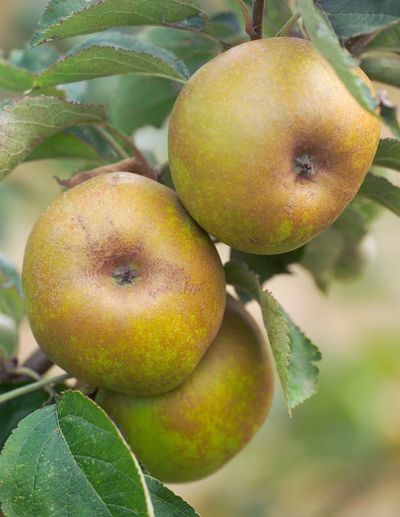Ashmead’s Kernel Information
When it comes to appearance, Ashmead’s Kernel apples aren’t impressive. In fact, these rather odd-looking apples are somewhat drab, tend to be lopsided, and are small to medium in size. The color is golden to greenish-brown with red highlights. The appearance of the apple, however, is unimportant when you consider that the distinctive flavor is crisp and juicy with a pleasant aroma and a flavor that is both sweet and tart. Growing Ashmead’s Kernel apples is relatively easy, and the trees are suitable for a range of climates, including the warmer (but not hot) areas of the southern United States. This late season apple is generally harvested in September or October.
Uses for Ashmead’s Kernel Apples
Uses for Ashmead’s Kernel apples is varied, although most people prefer to eat them fresh or make super-delicious cider. However, the apples are also well-suited for sauces and desserts. Ashmead’s Kernel apples are great keepers and will retain their flavor in your refrigerator for at least three months.
How to Grow Ashmead’s Kernel Apples
Growing Ashmead’s Kernel apples isn’t difficult in USDA plant hardiness zones 4 through 9. Here are a few tips to get you started: Plant Ashmead’s Kernel apple trees in moderately rich, well-drained soil. Look for a better location if your soil is rocky, clay, or sand. If your soil is poor, improve conditions by digging in generous amounts of compost, shredded leaves, well-rotted mature, or other organic materials. Dig the material to a depth of 12 to 18 inches (30.5-45.5 cm.). Ensure the trees receive six to eight hours of sunlight per day. Like most apples, Ashmead’s Kernel apple trees aren’t shade tolerant. Water young trees deeply every week to 10 days during warm, dry weather. Normal rainfall usually provides adequate moisture once the trees are established. To water these apples trees, allow a garden hose or soaker to drip around the root zone for about 30 minutes. Never overwater Ashmead’s Kernel trees. Slightly dry soil is better than overly wet, waterlogged conditions. Feed the apples with a good, general-purpose fertilizer once the tree begins bearing fruit, usually after two to four years. Don’t fertilize at planting time. Never fertilize Ashmead’s Kernel apple trees after mid-summer; feeding trees too late in the season produces a flush of tender, new growth that is easily be nipped by frost. Thin excess apples to ensure larger, better-tasting fruit and prevent breakage of branches caused by excess weight. Prune Ashmead’s Kernel apple trees yearly, preferably shortly after harvest.
